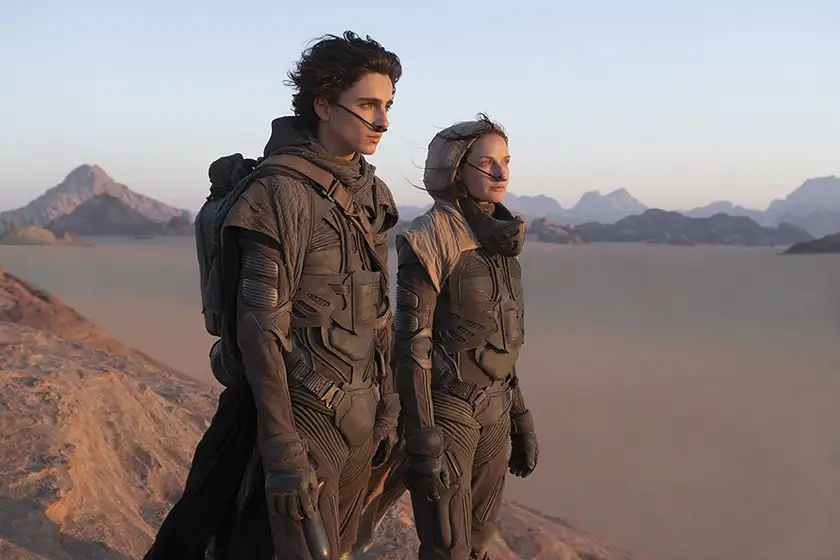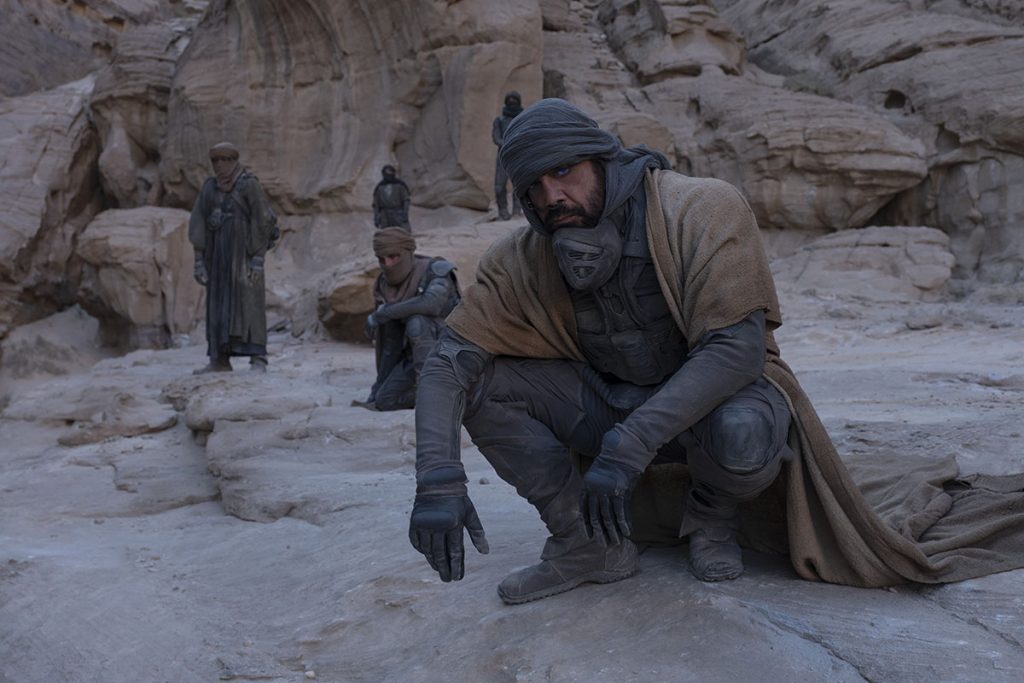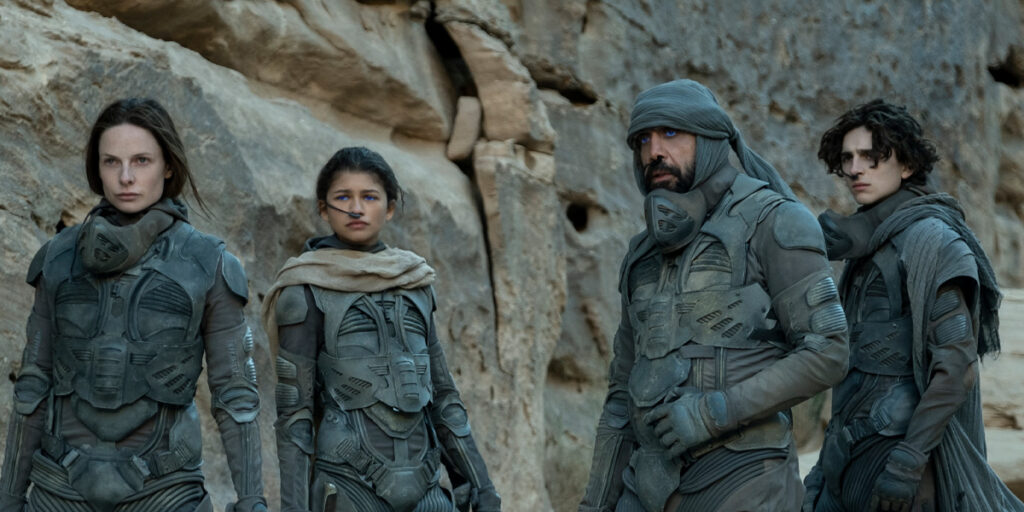Chalamet shines in Denis Villeneuve’s Dune (2021), both an immersive cinematic epic and a remarkable achievement in cinematography and sound design.
Initially scheduled to be released in 2020 and postponed many times due to the pandemic, Dune (2021) has been on everyone’s radar for over a year, and with good reason. Ever since the release of David Lynch’s 1984 misfire and an ambitious but flawed 2000 television miniseries, as well as the failed release of Jodorowsky’s promising adaptation, fans of Frank Herbert’s acclaimed novels have been waiting a long time for someone to bring Dune to the big screen while preserving the scale and scope of what continues to be one of the most beloved and influential sagas in sci-fi history.
And, with master storyteller Denis Villeneuve (Arrival, Blade Runner 2049) at the helm, a stellar cast, and a team of creatives of the likes of composer Hans Zimmer (Inception), director of photography Greig Fraser (Zero Dark Thirty), production designer Patrice Vermette (Arrival, Sicario), editor Joe Walker (Blade Runner 2049), and Oscar-winning visual effects supervisors Paul Lambert (First Man) and Gerd Nefzer (Blade Runner 2049), it won’t come as a surprise that Dune is just as enthralling, epic and stunning as we hoped it would be. Though Villeneuve’s latest film isn’t, at times, entirely satisfying narratively speaking, it’s certainly the best adaptation of the novel to date, as well as a technically flawless, incredibly immersive experience whose impressive world-building requires you to watch it on the biggest screen possible.
Set thousands of years in the future, Dune is a story that touches upon many themes and takes place in an interstellar society where different civilizations are fighting to gain control of “the most valuable substance in the universe” — a rare and highly valued natural resource they call the Spice, which can influence anything from space travel to commerce, knowledge, and even human existence itself. But Dune‘s universe is as complex as it is full of planets, whose inhabitants come with different sets of motives and purposes: there’s the desert planet of Arrakis, where the Spice can be harvested, but that is made inhospitable by elements that vary from unbearable heat and frequent sandstorms to terrifying, deadly “sandworms” that tend to show up at the worst possible time. Living on Arrakis are an indigenous, spiritual human civilization called the Fremen, as well as many wealthy “oppressors” that take turns colonising it, sent by the emperor to harvest the Spice.
When Dune begins, an imperial decree has just made Duke Leto of the House of Atreides (Oscar Isaac, of the Star Wars franchise and The Card Counter), from planet Caladan, the new governor of Arrakis, and that causes friction with the previous residents of the planet, the Harkonnens, rivals of the Atreides. Led by Baron Harkonnen (Stellan Skarsgård, of Chernobyl and Mamma Mia!) and eager to regain control of the planet, the former colonisers start plotting to defeat Duke Leto and his family — the Duke’s concubine Lady Jessica (Rebecca Ferguson, of Mission: Impossible – Fallout), who’s part of the Bene Gesserit, an ancient religious order of women with superhuman mental and physical abilities, and their son, Paul Atreides (Timothée Chalamet, of Call Me by Your Name and Little Women), who shares her mother’s powers and who also happens to be destined to save the universe and ensure the future of humanity.

Just like the book, the film begins with Duke Leto, Jessica and Paul embarking on a trip to Arrakis with swordmaster Duncan Idaho (Jason Momoa, of Aquaman and Game of Thrones), and follows them on a journey where nothing and no one are quite what they seem. As the Atreides attempt to forge alliances and fight for their own survival, Paul tries to decode a series of visions that mainly involve a mysterious Fremen girl whom we’ll later come to know as Chani (Zendaya, of Malcolm & Marie and HBO’s Euphoria), and to master the “Voice,” the power of the Bene Gesserit, in the attempt to become the “mind powerful enough to breach space and time, past and future” that many believe to be coming to save the world.
This brief introduction doesn’t even begin to describe the complexities of Dune‘s universe, a world made of a myriad of characters and exploring many themes, from religion and politics to environmental change, all while following a young man’s journey of discovery of his own identity, and a quest to fulfill his destiny that sees him battling against powerful, unknown forces. In fact, Dune‘s world is so intricate and full of characters, locations and unknown terminology that one of the issues with past adaptations of the novels was that the uninitiated struggled to understand the universe’s dynamics and rules: that was the case with David Lynch’s film, where the initial lack of explanations on the nature of the Sand and the characters’ role within the narrative made it hard for people who hadn’t read the novel to follow our hero’s quest.
But what’s really impressive about Dune (2021) is that it’s surprisingly easy to follow: co-writers Denis Villeneuve, Jon Spaihts (Prometheus) and Eric Roth (Forrest Gump) cleverly weave information into the narrative in a way that ensures we’re immediately able to grasp the essential facts we need to know about a world that never fails to be absorbing and intriguing, as there’s just as much mystery and action to keep us entertained throughout. In fact, it’s easy not to notice that Dune is nearly three hours long, as it’s so effortless to get drawn into an utterly fascinating world we can’t wait to explore, made all the more compelling by the film’s sound design and cinematography, as well as a series of memorable performances that will have your eyes glued to the screen.
As a fan of the novels, it has been a lifelong dream of composer Hans Zimmer (Inception) to score a Dune adaptation, and, when the opportunity came along, he rose to the occasion by crafting an unforgettable, instantly iconic score that highly contributes to giving the film a more defined identity, as well as making it more immersive and affecting on an emotional level. Dark, ominous cues make the tension rise and the action become more urgent, while percussions draw us into the film’s mysteries; the use of certain notes often gives the film an otherworldly quality, and a feeling of suspension of time, while a chorus of female voices makes everything more solemn and mystical, reflecting the power of the film’s female characters.
And, if Dune‘s score and sound design give the movie more depth and meaning, it’s the film’s stunning world-building that gives us a world that you’ll instantly recognise if you’ve read the book, and that you’ll be immediately drawn to even if you haven’t. While the sci-fi components of the film, such as the suits worn by the Fremen, the sandstorm and a series of buildings, ships and props, are somewhat reminiscent of Arrival, the gorgeous, desaturated palette that defines Arrakis gives us plenty of meditative, quiet moments, while the mystical quality of Paul’s visions reflect his mental state, as well as the journey that’s ahead of him.

Needless to say, Paul couldn’t have been played by anyone else but Timothée Chalamet, who inhabits the role with incredible confidence, showing us a character in constant evolution who does what he can to control the forces (and Voices) inside him without losing his own self, all while having to unexpectedly take on a new role that’s bigger than himself. If the film’s screenplay gives Paul plenty of epic, memorable lines, it’s Chalamet who brings his character to life by letting raw emotion through at exactly the right times, showing us a “lost boy hiding in a hole in the ground” who inevitably becomes the leader he was meant to be — which makes for highly rewarding, meaningful storytelling. Sharing many scenes together, Chalamet and Rebecca Ferguson complement each other perfectly, and the chemistry between them is undeniable.
Ferguson excels at playing one of the most complex characters in the film, showing us a woman who’s constantly conflicted between her duties as a sorceress and as a mother, and giving us more than one goosebump-worthy scene while also conveying the wisdom of someone who’s seen and experienced a great deal during her lifetime. Chalamet and Ferguson are the film’s standouts, but every single cast member gives us incredibly committed performances that help give depth to their characters: Oscar Isaac moves us more than once as Duke Leto, one of the film’s most likeable characters, while Javier Bardem (No Country for Old Men) imbues enigmatic Fremen leader Stilgar with passion, gravity and raw power with facial expressions alone.
Zendaya‘s body acting draws us to her character even if she hardly ever speaks, Stellan Skarsgård never fails to terrify us as Baron Harkonnen, and Dave Bautista (the Guardians of the Galaxy films and Avengers: Endgame) and Josh Brolin (Milk and Avengers: Infinity War) are just as fearsome as Harkonnen’s nephew and war master. Among the supporting characters, the standout is Sharon Duncan-Brewster (Sex Education), who plays ecologist Liet-Kynes (who has been gender-swapped from the novels), one of Dune‘s most fascinating and intriguing characters, made unforgettable by the intensity with which Duncan-Brewster delivers her lines.
When I left today’s screening of Dune at the Venice Film Festival, I was mesmerised by the craft on display, from the film’s achievements on a technical level to a series of highly believable, committed performances that, alone, make the film so very compelling and absorbing. Yet, I found that something was missing, and that something has to do with the film’s narrative. While it’s no secret that the director would like there to be a Part 2 to the film, it’s also hard not to notice that Dune would feel absolutely incomplete if it were to stand on its own, as not only does the entire film revolve around a conflict that isn’t resolved by the time it ends, but the ending itself feels like it should be a beginning, and it can be very frustrating to get invested in a story that ultimately leaves you with no answers and no real resolution.
Only time will tell what Dune will turn out to be, as a final product, and whether or not it will be developed into something more than a standalone film: for now, we can enjoy watching an incredibly well-crafted adaptation that’s faithful to the source material while also breathing new life into it, and an immersive, epic cinematic journey that will absolutely leave you aching for more.
Dune premiered at the 2021 Venice Film Festival on September 3, 2021 and is now available to watch on digital and on demand.

